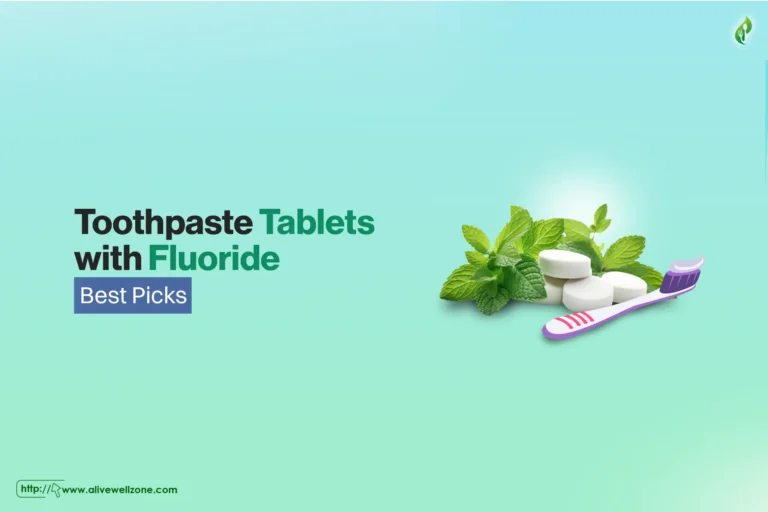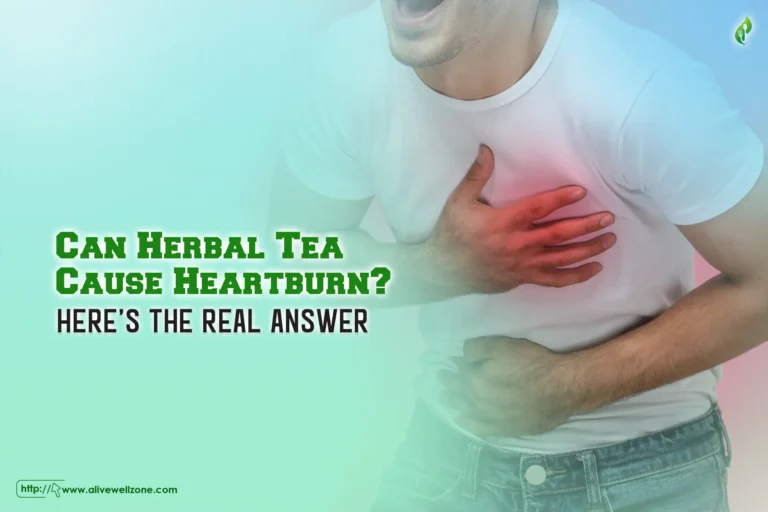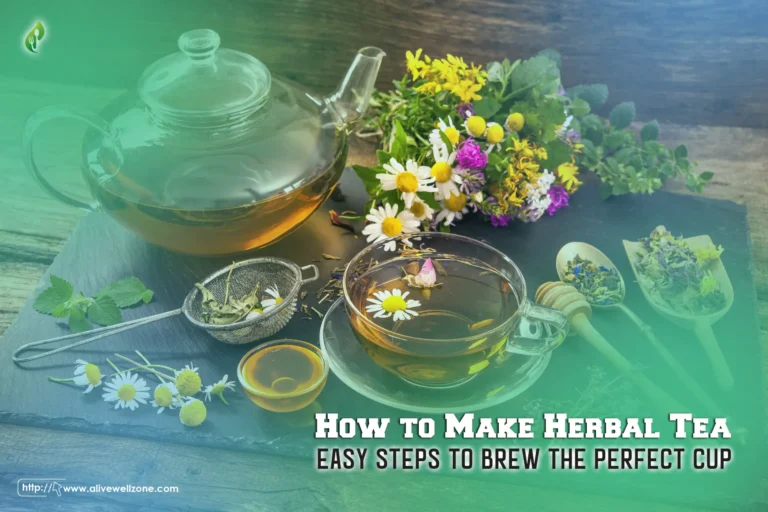
Last Updated on November 8, 2024 by Helena Akter
Cataract surgery done? Great news! You’ll be seeing the world clearly soon. But don’t bite into that celebratory cake for now. Because you must know what food not to eat after cataract surgery for a quick recovery.
You shouldn’t eat sugar, refined carbohydrates, processed foods, tobacco, and alcohol after cataract surgery. These can slow down your recovery by causing inflammation, slowing down healing, and increasing the risk of complications.
Instead, focus on a balanced diet! That said, we’ll explore the best foods for recovery and share some helpful post-surgery tips for you. So, get ready to fuel your body for clear vision and a smooth recovery!
Key Takeaways
- Improve Healing with Nutrition: Eating nutrient-rich foods helps repair tissues and cells after cataract surgery. It also controls inflammation and prevents infections, ensuring a smoother recovery.
- Foods to Avoid: Reduce intake of sugar, refined carbs, processed foods, salt, fried foods, alcohol, and tobacco. These can slow down healing and cause complications after surgery.
- Post-Surgery Diet: Drink plenty of water and eat green leafy vegetables, vitamins C and A, fiber-rich foods, carbs, spices, and protein-rich foods to aid recovery and maintain eye health.
- Eye Health Prevention Tips: Protect your eyes from the sun, avoid smoking, wear protective eyewear, eat a healthy diet, and limit alcohol to reduce cataract risk and improve long-term eye health.
Why You Should Eat Well After Cataract Surgery?
As you age, cataracts become increasingly common. By the time you reach 80, chances are you’ll either have cataracts or have undergone surgery to remove them, says the National Eye Institute (NEI).
In 2020 alone, cataracts caused blindness in approximately 15.2 million people aged 50 and older. Plus, an additional 78.8 million experienced moderate-to-severe visual impairment.

So, why is eating well important after cataract surgery?
- Promotes Healing: Nutrient-rich foods provide the necessary vitamins and minerals to repair tissues and cells damaged during surgery.
- Controls Inflammation: A balanced diet helps regulate inflammation, helping in your recovery.
- Prevents Infection: Proper nutrition supports a healthy immune system, reducing the risk of post-surgery infections.
Remember, taking care of your body through good nutrition can significantly impact your healing process.
What Food Not to Eat After Cataract Surgery?
Your diet plays a vital role in your recovery after cataract surgery. Certain foods can either support or delay your healing process. To ensure optimal eye health, you need to make informed choices.
That said, following are the food not to eat after cataract surgery —
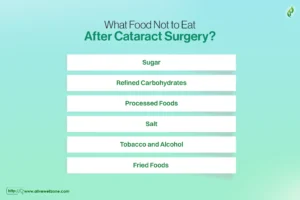
Sugar
The first one that comes up on the list of food not to eat after cataract surgery is sugar. It can slow down your healing process. The worst part is that it doesn’t even provide nutritional benefits and may even harm your eyes.
Plus, diets high in sugar, red meat, and processed foods are associated with early age-related macular degeneration (AMD). So, to support your eye health, steer clear of sugary foods.
Refined Carbohydrates
Refined carbohydrates, like white rice, white bread, and refined cereals, can spike blood sugar levels. It can potentially damage blood vessels in your eyes, slowing down your recovery. A 2020 review highlighted that high-glycemic diets (rich in sugar and refined carbs) may increase the risk of cataracts and AMD.
In addition, opt for smart carbohydrate choices to support overall health.
Processed Foods
Processed foods often contain high levels of sugar, sodium, and unhealthy fats. Unfortunately, they lack the vital nutrients your body needs for healing.
So, during recovery, avoid items like —
- Canned meals
- Savory snacks
- Processed meats
- Breakfast cereals
- Baked goods
These foods can lead to inflammation and provide little nutritional value.
Salt
High sodium levels are linked to inflammation and a rise in blood pressure, which can harm your eyes during recovery. So, foods like canned soups, fast food, and processed snacks should be minimized. Instead, prioritize fruits and vegetables, as the National Cancer Institute recommends to support better eye health.
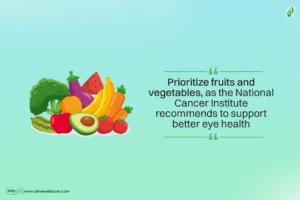
On top of that, aim to limit your daily salt intake to no more than 2,300 milligrams. This small adjustment can significantly support your healing process.
Tobacco and Alcohol
Both heavy drinking and smoking pose risks after surgery. Plus, alcohol can cause inflammation and slow down your healing process. Meanwhile, tobacco use increases the chances of infection and delays recovery.
To ensure a smooth and swift healing journey, it’s best to steer clear of both.
Fried Foods
Don’t eat fried foods such as French fries and fried chicken. These foods contain unhealthy fats. Studies, including one from 2015, have linked diets high in saturated fat to a greater risk of developing cataracts.
An eating pattern rich in processed meat, fried foods, and high-sugar items may even lead to long-term vision loss, the British Journal of Ophthalmology reports.
8 Foods to Eat After Cataract Surgery for Speedy Recovery
After cataract surgery, maintaining a healthy eating habit is vital for optimal healing and visual outcomes. Including specific foods in your diet can promote healing and support overall eye health.
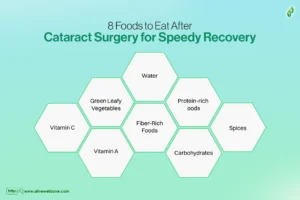
1. Water
Drinking 2 to 3 liters of water daily is important post-surgery. It helps your —
- Metabolism
- Promotes healing
- Prevents dehydration
- Helps remove waste from your body
2. Green Leafy Vegetables
Rich in iron, green leafy vegetables help prevent anemia and support overall health. Hence, include iron-rich green leafy veggies like —
- Spinach
- Fenugreek
- Cabbage
- Lettuce
They support overall health and prevent anemia.
3. Vitamin C
Vitamin C (ascorbic acid) speeds up recovery by protecting against UV damage and promoting blood vessel development. That’s why enjoy —
- Oranges
- Papaya
- Sweet lime
- Kiwi
- Strawberries
- Tomatoes
- Potatoes
4. Vitamin A
Vitamin A maintains corneal epithelial cell health, important for vision. For that, you can eat —
- Carrots
- Broccoli
- Sweet potatoes
- Spinach
- Kale
- Dairy products
5. Fiber-Rich Foods
These foods regulate bowel movements and prevent constipation. That’s why you must include —
- Beans
- Nuts
- Berries
- Lentils
- Oats
- Legumes
- Quinoa in your meals for adequate fiber intake.
6. Carbohydrates
While usually limited, our body needs carbohydrates. They provide important energy needed for your recovery after surgery. Thus, choose —
- Bananas
- whole wheat
- Buckwheat
- Oats (in moderation) to support healing.
7. Spices
Certain spices, like —
- Bell pepper
- Cumin
- Ginger
- Turmeric
These foods improve your immune system and have anti-inflammatory properties. Regular consumption of spice may reduce the risk of cataracts and macular degeneration, promoting overall eye health.
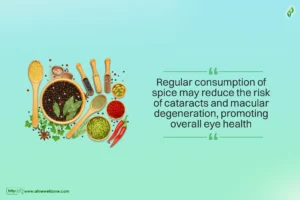
8. Protein-rich foods
Protein supports cell health and proper blood vessel function. Thus, you better incorporate —
- Chicken
- Eggs
- Salmon
- Nuts
- Dairy products
- Seeds into your diet to help healing.
Beneficial Tips to Prevent Cataract Surgery
While cataracts can’t be completely prevented, certain measures can reduce the risk. Here are some helpful tips —
- Protect your eyes from the sun with a hat and sunglasses.
- Quit smoking to improve overall eye health.
- Use protective eyewear during sports or when handling power tools.
- Eat a diet rich in fruits, vegetables, leafy greens, nuts, and whole grains.
- Limit alcohol consumption.
Final Words
So, what food not to eat after cataract surgery? Avoid sugar, refined carbs, processed foods, etc. In fact, after cataract surgery, you must focus on nutrient-rich foods to promote healing, control inflammation, and prevent infections.
Remember, a balanced diet is vital for your eye health and overall well-being. By making informed dietary choices, you can support a smoother and faster recovery.
FAQs
What is the best food to eat after cataract surgery?
The best food to eat after cataract surgery includes protein-rich options like eggs, fish, chicken, turkey, and tofu. These foods help regenerate eye tissue and speed up the healing process.
What not to drink after cataract surgery?
You shouldn’t drink beer, wine, or any alcohol for at least 24 hours after cataract surgery. Alcohol can interfere with the healing process and increase the risk of complications.
Can I drink milk after cataract surgery?
No, you shouldn’t drink milk after cataract surgery. If you experience irritation and inflammation, dairy proteins and fats can negatively interact with delicate eye tissues. For a smooth recovery, restrict or avoid milk products during the healing period.
Can you eat eggs after cataract surgery?
Yes, you can eat eggs after cataract surgery. Eggs are rich in protein and essential nutrients that aid in the regeneration of eye tissue and support the healing process. Including eggs, along with other protein sources like fish, chicken, and tofu, can help speed up your recovery.
How soon can I eat after cataract surgery?
You can eat a light meal as soon as you feel comfortable and alert after cataract surgery. It is recommended to avoid alcohol for about a week and stay hydrated by drinking plenty of water. Always follow your doctor’s specific dietary instructions for the best recovery.

